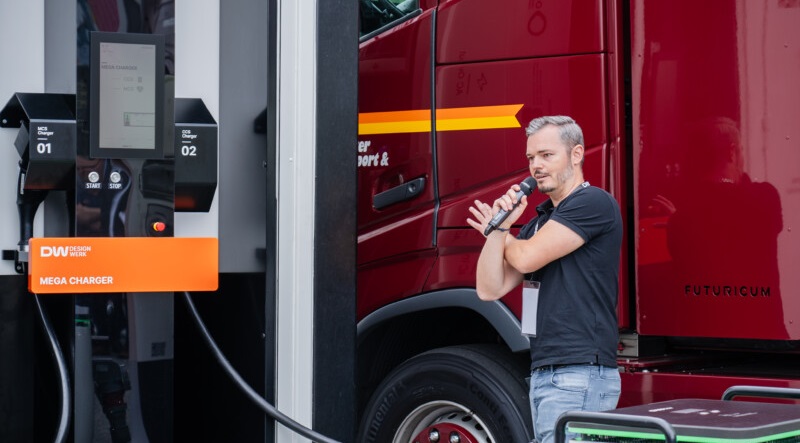During the “Innovation Day by Galliker” in Altishofen, Designwerk Technologies AG inaugurated its first Mega Charging station.
This battery-buffered rapid charging system, housed in a standard container, is designed to charge heavy electric trucks efficiently.
Additionally, it aims to alleviate strain on the power grid during peak load times.
Together with pilot customer Galliker Transport AG, Swiss e-mobility specialist Designwerk Technologies AG is bringing future-oriented solutions to the present.
The so-called “Stationary Battery Backed Mega Charger” (SBC) from Designwerk was officially launched after a development phase of approximately two years.
The unveiling ceremony, attended by Ständerat Damian Müller, Martin Bütikofer, Director of Verkehrshaus Schweiz, and Andreas Burgener, former Director of Auto Schweiz, provided guests from Switzerland and Germany an exclusive insight into the world of Mega Charging for heavy commercial vehicles.
The charging station had previously been awarded “The Smarter E-Award” in the E-Mobility category.
Utilization of solar power from the site grid
The combination of storage and charging solution at Galliker includes four battery packs with a total capacity of 1000 kWh, expandable to a maximum of 2000 kWh.
The station is charged during daylight hours using self-generated solar power.
Felix Felder, Head of Fleet Management at Galliker Transport AG, explains: “By using the battery-buffered charging station, we can efficiently charge our electric commercial vehicles around the clock using solar power generated during the day.”
“The Mega Charger can also contribute to the stability of our site grid by smoothing out peak loads,” he adds.
Forward-compatible and powerful
Initially, Galliker’s charging station features two CCS charging points, each capable of 420 kilowatts DC.
The Designwerk SBC charging container, developed as part of a demonstration project with support from the Swiss Federal Office of Energy (BFE), enables charging capacities of up to 1.05 megawatts.
This also serves as the infrastructure foundation for the international Megawatt Charging System (MCS) standard.
Once standardization is complete, MCS charging ports will be available for both initial installation and retrofitting. This brings the decarbonization of heavy commercial vehicles for long-distance travel within reach.
Focus on sustainability and efficiency
By integrating the Mega Charging station into Galliker’s site grid, self-consumption of solar power is maximized, ensuring electric vehicles are powered by renewable sources.
The combination is facilitated by the Joint Consumption Association (ZEV), which consolidates solar production across multiple properties.
An energy management system ensures load shedding, load shifting, and storage control.
This solution illustrates how renewable energy and charging technologies can be combined to shape the future of transport logistics.
Thorben Maier, Head of Sales and Customer Service Charging Technology at Designwerk Technologies AG, emphasizes: “The commissioning of the Mega Charger at Galliker marks a significant milestone in the development of future-proof charging infrastructure for heavy commercial vehicles.”
“Our technology enables logistics companies to sustainably cover a variety of charging scenarios, while buffering storage relieves strain on the power grid,” he adds.
The pilot facility’s commissioning initiates the testing of various strategies for grid relief and economical operation.






